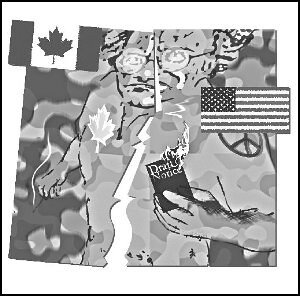By Stephen Strauss
January 8, 2005
As I was growing up in that suburban Denver gentleness called University Hills the least likely thing I would have expected as a life's calling would have been "professional draft dodger." But here I am more than 35 years after leaving the United States, spoken about in at least three books, quoted newspapers and on television numerous times, and so imbedded in "draft dodgerness" that my two adult children were recently interviewed to see how my single, political act had affected them.
 What is strange in all of this is that I have been regularly insisting to American reporters and academics who interview me that while they see me as an emigrant, I mostly see myself as an immigrant. The hurt and anger I felt leaving the United States is a warp that has been woven into the peaceful and obedient weft of Canadian social life; I was Born in the U.S.A. but Made in Canada. However, the certainty that the meaning of my life has less to do with where I came from and more to do with where I went has been shaken by the war in Iraq and its vicious aftermath. The placid, well-behaved Canadian I have become is shocked with how viscerally American my response has been to the whole affair.
What is strange in all of this is that I have been regularly insisting to American reporters and academics who interview me that while they see me as an emigrant, I mostly see myself as an immigrant. The hurt and anger I felt leaving the United States is a warp that has been woven into the peaceful and obedient weft of Canadian social life; I was Born in the U.S.A. but Made in Canada. However, the certainty that the meaning of my life has less to do with where I came from and more to do with where I went has been shaken by the war in Iraq and its vicious aftermath. The placid, well-behaved Canadian I have become is shocked with how viscerally American my response has been to the whole affair.
My body tells me that I continue to be someone who believes that the world should become a democratic and free place. I say "body" because my views don't feel like opinion so much as an electrified instinct - a mental version of the involuntary reflex kick which makes a frog's leg quiver even after it is dead. The Stephen Strauss whose American core has been exposed vibrates when tyrants are overthrown, the oppressed are freed and the fundamental notions of liberty and equality embedded in the U.S. Constitution are declared universals. My unalloyedly democratic gut wants Iraq to function like University Hills and Denver and Colorado, because it thinks that Iraq's former rule was an abomination.
And then I reflect back to 1968 and my dilemma with Vietnam. I see again the born-in-the-USA idealist having to deal with the reality that some nations define freedom as meaning that neither the United States nor anyone else can tell them what to do. That their histories are not democratic or liberal and they see forcing them to become so as actually telling them they can't be themselves. And how these contradictions led me to conclude that the one thing I could not do in my life was to kill someone in the name of making them free, especially if that freedom was going to support a new ruler who looked exceedingly like a warlord or a mullah or simply a blatant opportunist.
I see myself idealistically writing to Lyndon Johnson and saying that I didn't think he was a bad man, but I couldn't fight in a bad war. And I see the note sent back to me from the Selective Service colonel to whom my letter had been forwarded in which he told me that I had a right to any opinion I wanted in a free country but if I didn't report for the draft I was liable to a $5,000 fine and/or five years in jail. And I see myself answering in my mind: Free people always have options other than those their governments tell them exist.
I don't know what is going to happen in Iraq, but I can feel the same cruel, crossing winds blowing as they did in 1968. I sense them in the emerging fears that a volunteer army will no longer be able to recruit soldiers who have to deal with the fact that they will to go off to a place where people kill their liberators; I see a Vietnam-like paradox in the visage of a Colorado soldier with his leg blown off whose voice says "I just did my duty," but whose eyes announce: "For what end? For what purpose?"
I see what is happening now and feel it as something that was happening then.
And as I reconnect with the American I thought I had buried in the snows and stillness of my adopted country, I hear echoing in my mind the words of a man born in Canada but made in the USA.
"The practice of politics does not consist of the art of the possible. It consists in choosing between the calamitous and the unpalatable," John Kenneth Galbraith, then U.S. ambassador to India, wrote to Washington while the war in Vietnam was raging.
And in response, the unintended professional draft dodger I have become fears that the United States, whose good intentions I so deeply quiver to, again has eschewed the unpalatable and instead chosen the calamitous for itself, for Iraq, and for the world.
Stephen Strauss was a science columnist and editorial writer with The Globe and Mail in Toronto.
Copyright 2005, Rocky Mountain News. All Rights Reserved.
No comments:
Post a Comment